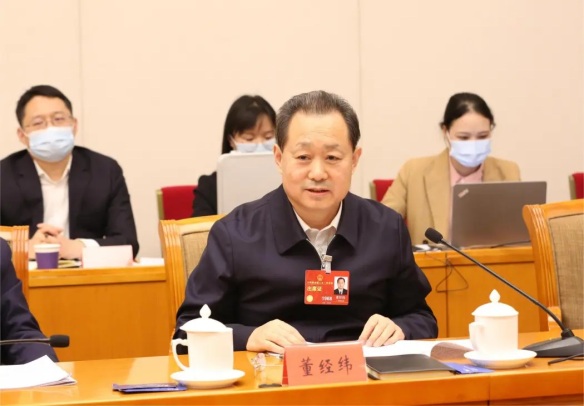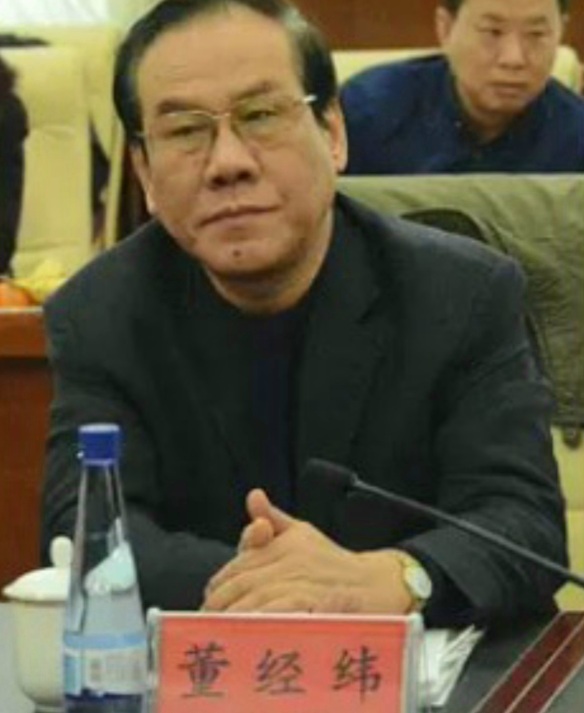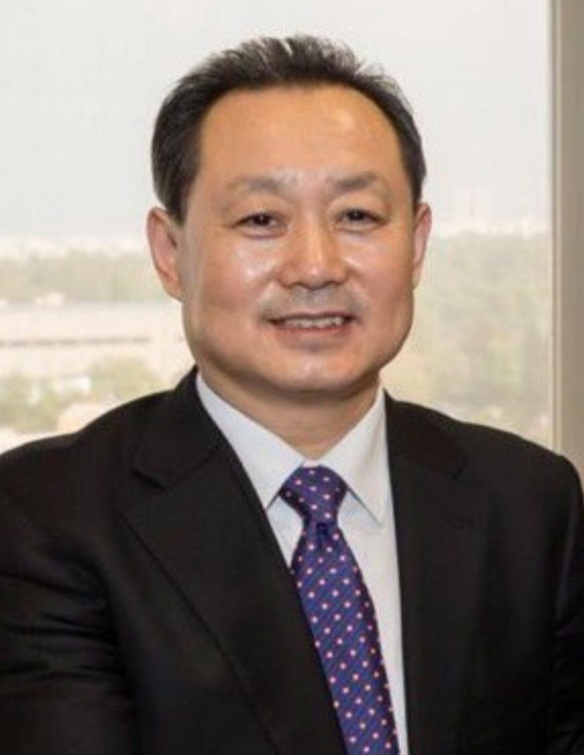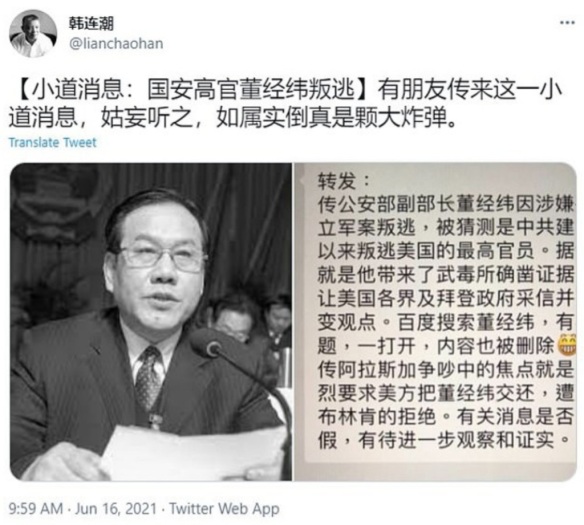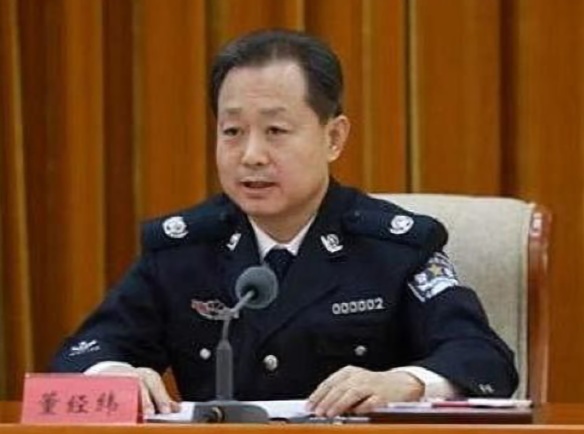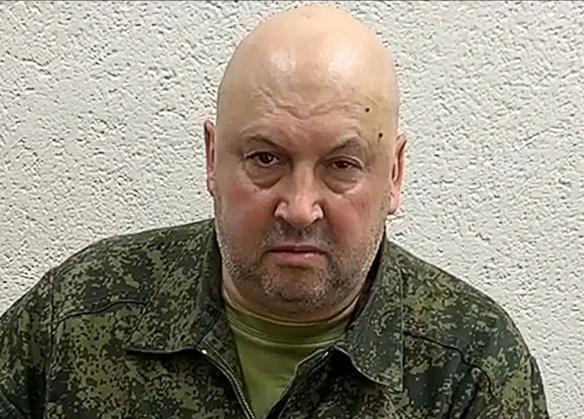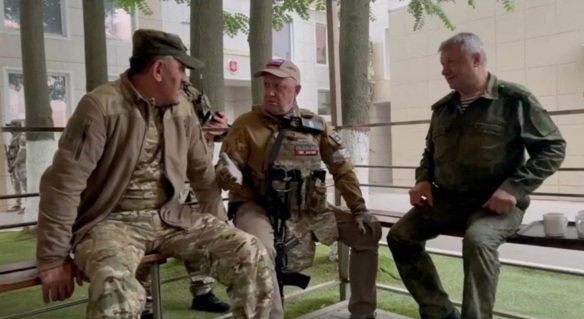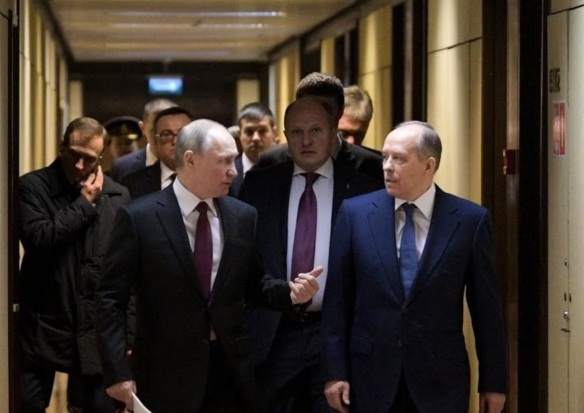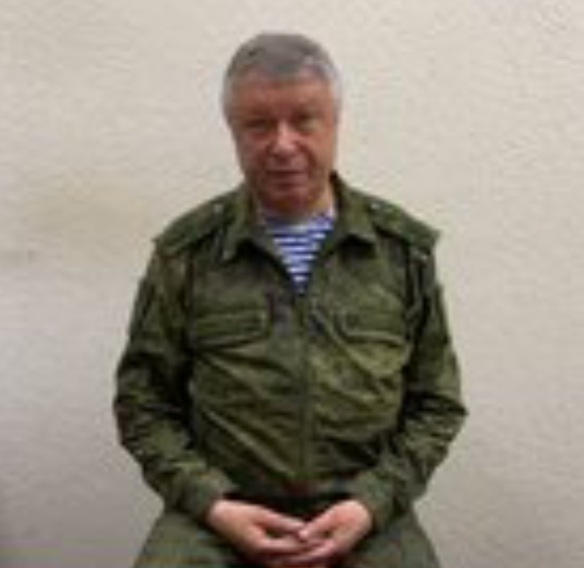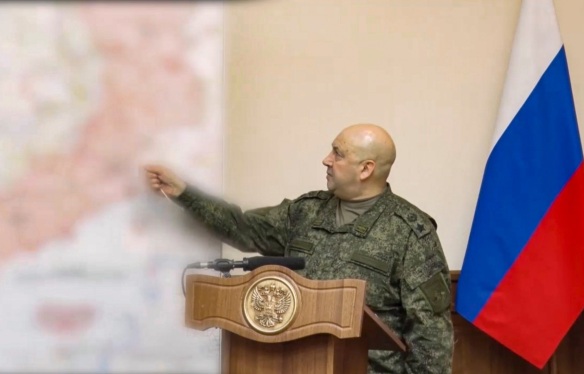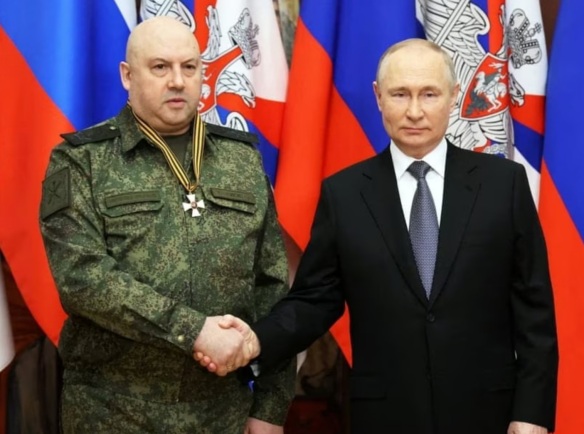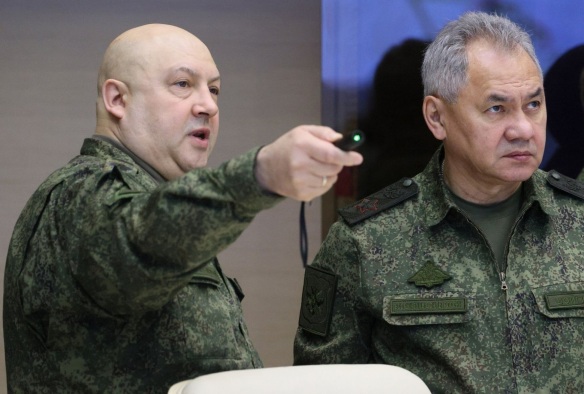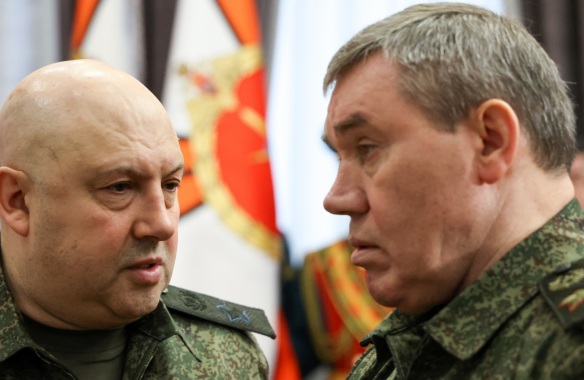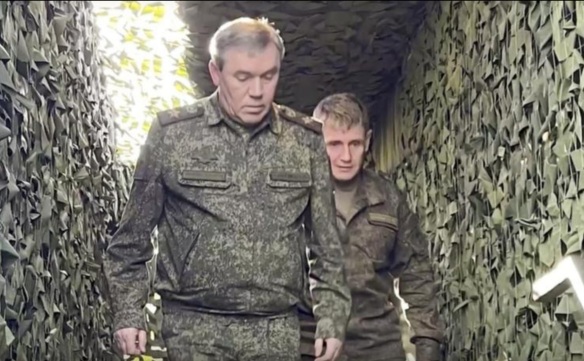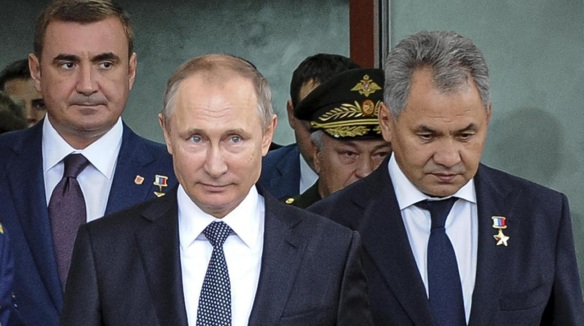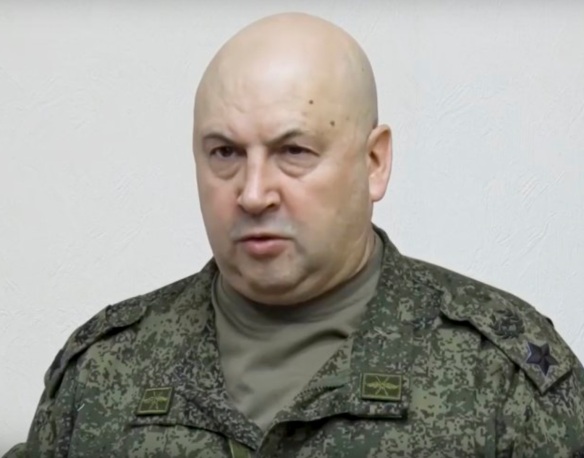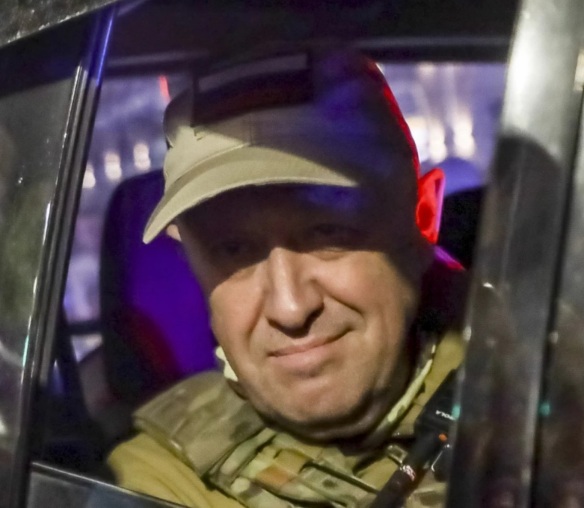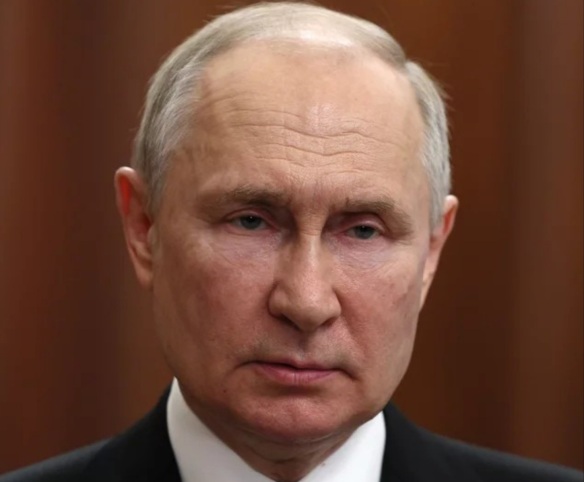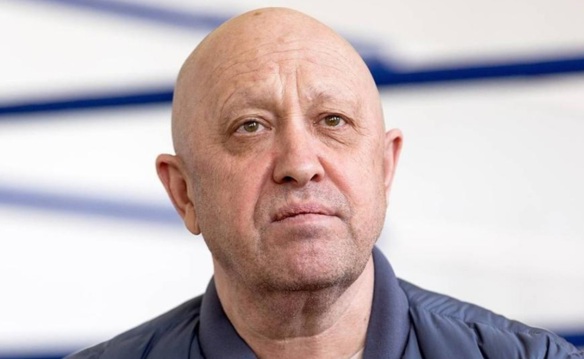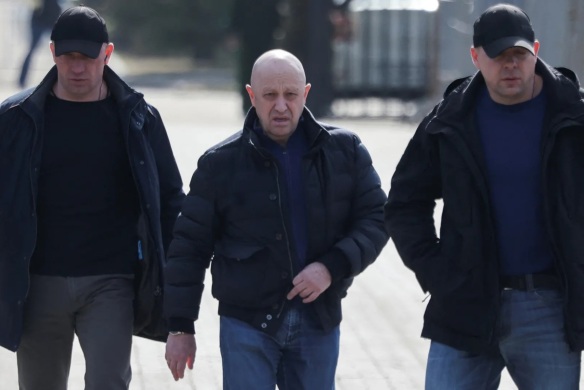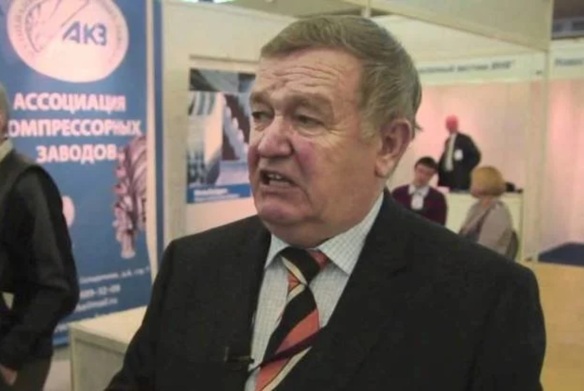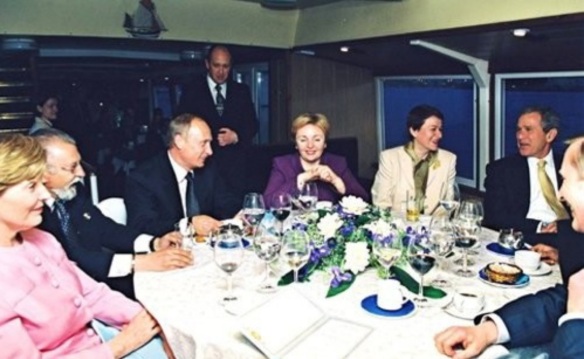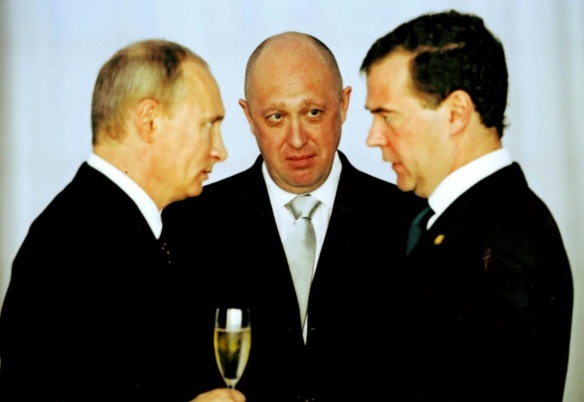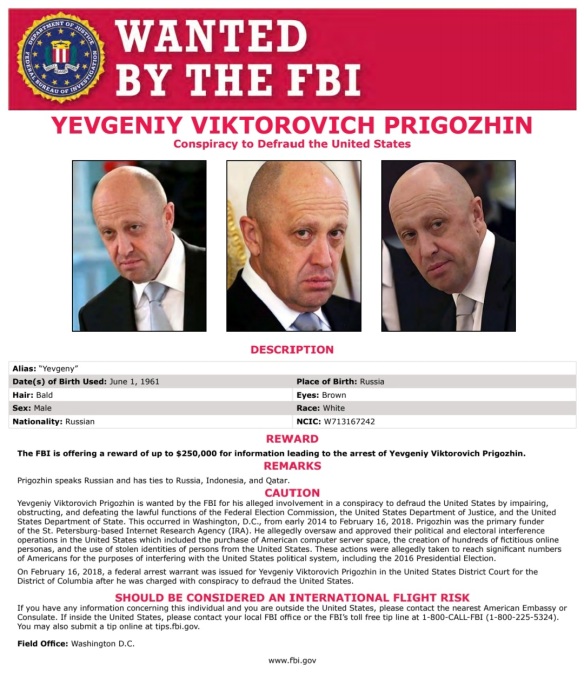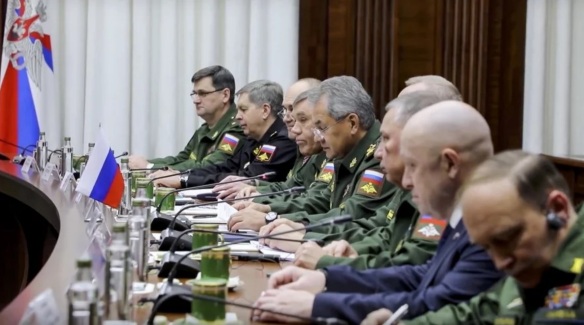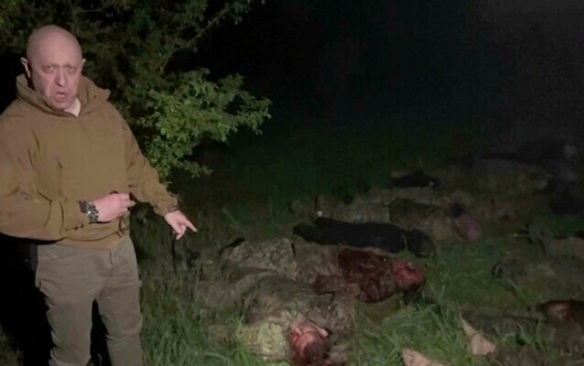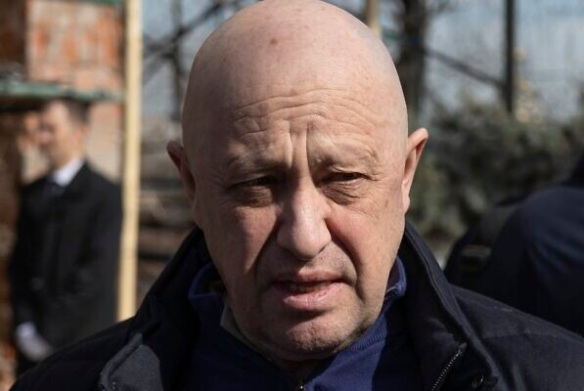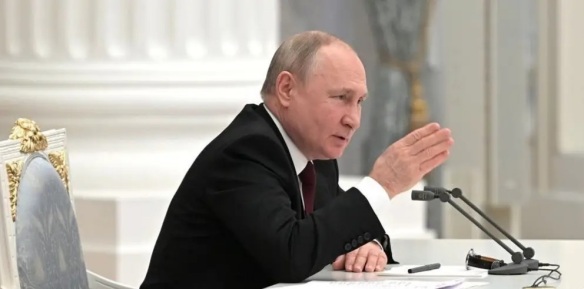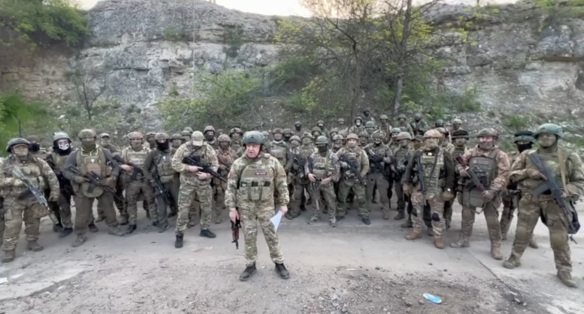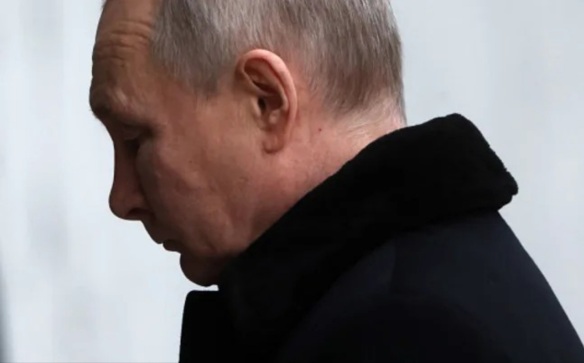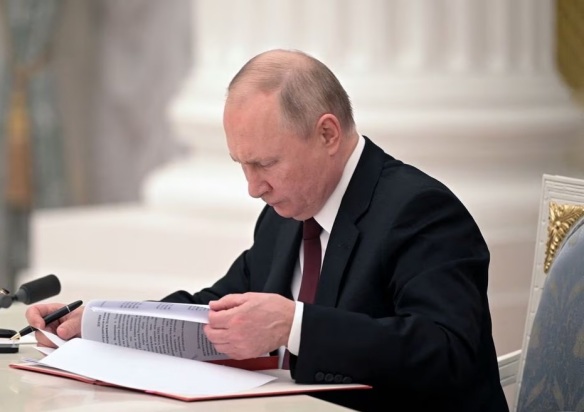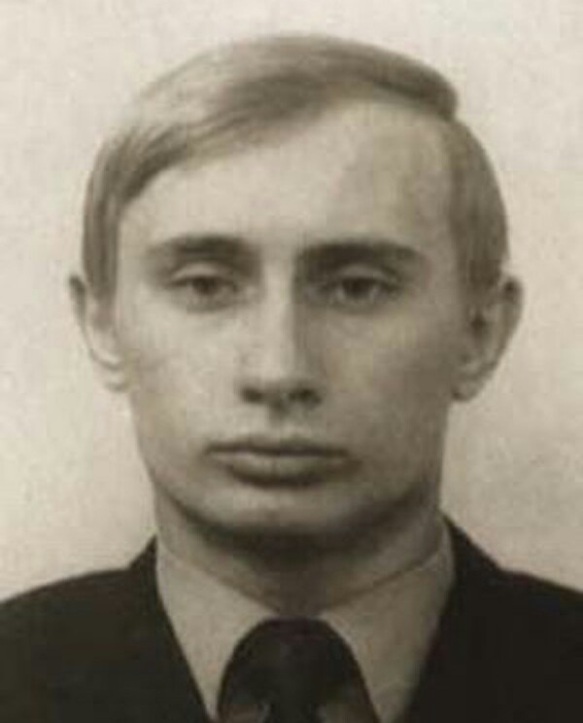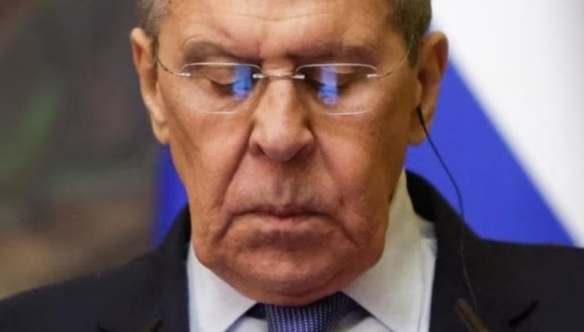Dong Jingwei (above). Without a doubt, Hong Kong and its future are issues of great concern for People’s Republic of China President and Communist Party of China Party Secretary Xi Jinping and the Party leadership in general. Likely to Xi’s satisfaction, Dong Jingwei is now in firm control of issues concerning protests and conspiracy against the regime and foreign sponsored efforts to orchestrate and sustain resistance in the city. Having pondered Dong’s posting and its responsibilities, greatcharlie has sought in this essay to dive a bit deeper into Dong’s background to better understand him and to meditate on his likely plans to get a handle on Hong Kong. Interestingly, in the photo image above provided by the Guangxi People’s Congress, conspicuously displayed on center of Dong’s jacket (above) is his official name tag. Readers may note, Dong is the only attendee visible in the photo that displayed both a table placard and a name tag to identify himself. While he apparently saw the need for “maximum” identification to assure recognition, Dong at the time of a photo served in the fairly well-known and powerful positions of Vice Minister of the Ministry of State Security (MSS) and the Chief of MSS Counterintelligence.
On July 18, 2023, the People’s Republic of China Ministry of Human Resources and Social Security announced Dong Jingwei was appointed as the central government’s commissioner for the Office for Safeguarding National Security of the Central People’s Government in the Hong Kong Special Administrative Region. Dong succeeded Zheng Yanxiong was appointed director of the Liaison Office of the of the Central People’s Government in the Hong Kong Special Administrative Region in January 2023. The Office for Safeguarding National Security was established in 2020 just months after China imposed a national security law in the wake of extended pro-democracy and anti-People’s Republic of China government protests that began in 2019. Protests were attended reportedly by as many as half a million people, In 2022, a HK$508 million ($65 million) headquarters building was constructed in Hong Kong for the organization. Zheng was the first director and.a founding member of Dong’s new office. John Lee Ka-chiu was installed as the Chief Executive of Hong Kong Special Administrative Region on July 1, 2022. Upon the announcement of Dong’s appointment, Lee welcomed him in a statement saying Hong Kong “will continue to work and communicate closely” with the Office for Safeguarding National Security as it seeks to fully implement the 2020 law.
Concerning the 2020 national security law, following the Hong Kong protests from 2019 to 2020, the People’s Republic of China imposed it to enable the prosecution of four major crimes, stamping out dissent. Zheng, at that time, pursued dissenters with vigor and was consequently sanctioned by the US for his activities. Of equal concern was the need to eliminate external influences in the form of foreign intelligence services. Beijing reported with conviction that they were entangled in Hong Kong’s protest activities, providing both funding and direction to pro-democracy and anti-government activists. His extensive background at Zhōnghuá Rénmín Gònghéguó Guójiā Ānquán Bù (Ministry for State Security of the People’s Republic of China) or the MSS and working alongside Zhōnghuá Rénmín Gònghéguó Gōng’ānbù (the Ministry of Public Security of the People’s Republic of China) or MPS, in part gave Dong a leg up for selection to the commissioner’s job. MSS is essentially the People’s Republic of China’s equivalent to the US Central Intelligence Agency (CIA) and is responsible for foreign intelligence worldwide and counterintelligence both abroad and at home. MSS counterintelligence is directly aimed at the infiltration of foreign intelligence and counterintelligence services and the neutralization of their operations. MPS is a sort of dual law enforcement and intelligence service under the State Council in charge of the country’s internal and political security and domestic intelligence. MSS and MPS share the counterintelligence mission for the People’s Republic of China. As national security bureaucracies, both organizations are organized under the State Council of the People’s Republic of China Central Committee of the Communist Party of China, but both have settled lines to the highest realms of power into the Party. Very likely, it was Dong’s successes against foreign intelligence networks and operatives on the mainland in particular as the Chief of MSS Counterintelligence that also caused him to stand out of the best choice.
Interestingly, official sources on Dong’s appointment were especially frugal with their information about his intelligence background, never mentioning his very accomplished previous post as the Chief of MSS Counterintelligence. At the time of the announcement of Dong’s appointment, a representative for the Hong Kong government did not immediately respond to a request for comment on Dong’s appointment, including his past experiences at MSS. The China Daily only went as far to state Dong was the director of the political department of the MSS from 2017 to 2018, according to a resume published on the website of the China Law Society, of which he is vice president. It added the he previously served as director of the Hebei Provincial Department of State Security from 2006 to 2017. Omne ignotem pro magnifico. (Everything unknown is magnificent.)
Without a doubt, Hong Kong and its future are issues of great concern for People’s Republic of China President and Communist Party of China Secretary Xi Jinping and the Communist Party of China’s leadership in general. To what is likely Xi’s satisfaction, Dong is now handling of issues in the city concerning protests and conspiracy against the regime and foreign sponsored efforts to orchestrate and sustain such resistance. In this essay, greatcharlie has sought in this essay to dive a bit deeper into Dong’s background, to include apparent safeguards taken for his security and what may have been external efforts against him, and what he may have in mind for quelling the threat posed by the People’s Republic of China’s opponents’ in Hong Kong. Thoughts are offered not only on decisions he has likely made but also on decisions he may likely make in the immediate future to shape events. Dong may have reason to believe the national security situation in Hong Kong may soon turn considerably in the Communist Party of China’s favor. This essay is relatively brief and could hardly have squeezed issues dry so to speak and put one in the full picture of regarding Dong’s thinking. However, the hope is that greatcharlie’s ideas and insights may lead readers, hopefully to include some practitioners in the field of foreign and national security policy analysis and decisionmaking, to develop new lines of thought on how to proceed concerning this pressing issue. Luce sunt clariora tua concilia omnia. (All your advice is clearer than the light.)
Before July 2021, this photo image of Dong Jingwei (above) was accepted by greatcharlie as authentic. As with all other elements of the intelligence industry, counterintelligence work requires wisdom, reason, and logic to be performed well. It is not the nature of intelligence services to regularly use force and aggression to halt an opponent, shut down its networks, thwart its operations, and intercept its intelligence officers, operatives, and informants. The intellect is the tool used for doing so. Dong is a man who has a deep understanding of how people tick, how they fit in and feel where they live and work, and how they can get the ones they have targeted tangled up in their respective espionage enterprises. In attempting to ascribe certain traits to Dong given his role at MSS, those considered by greatcharlie may appear to be mere abstractions. However, among the few traits listed should be a reliable intuition, further honed when at MSS he coped with challenges posed by foreign opponents. It may have enabled Dong to perceive likely thinking, decision making, planned approaches, and actions of managers within the intelligence services of opponents.
Things To Know about Dong
As reported by greatcharlie in its June 30, 2021 post entitled, “The Defection That Never Was: Meditations on the Dong Jingwei Defection Hoax”, Dong was born on November 18, 1965. At the time of this writing, he is 59 years old. In the People’s Republic of China, it would be of some significance to note that he is of Han nationality. As for his studies, he earned a master of science degree. The only publicly reported member of Dong’s family is his daughter, Yang–also known as Dong HuaHua on social media, She is the ex-wife of Jiang Fan, who at the time was an Alibaba executive, heading the company’s e-commerce platforms, Tmall and Taobao.
Suffice it to say Dong is a member of the Communist Party of China. Highlights of his career include service as the Secretary of the Party Committee and Director of the State Security Department of Hebei Province from 2006 to 2017. He served as Director of the Pokitical Department of the Ministry of State Security from 2017 to 2018. He eventually became a Member of the Party Committee and Vice Minister of the Ministry of State Security and the Chief of MSS Counterintelligence. It was noted in the July 24, 2015 edition of Intelligence Online that Dong’s direction of the State Security Department in Guo’anbu in the Hebei Province was significant for him as that province has reportedly produced many of Xi’s “securocrats.” Loyalty to superiors, age, and regional background apparently put him in good standing with senior party officials under Xi. One could probably safely mention reliability and discretion. By 2015, Dong reportedly became part of the “Xi Jinping Clique”, one of the main political factions within the Communist Party of China. By 2018, Dong was close to Xi. Other important Communist Party of China titles and accolades provided to Dong include: Representative of the 18th and 19th National Congress of the Communist Party of China; and, Member of the 13th National Committee of the Chinese People’s Political Consultative Conference.
Further concerning the MSS, as briefly noted earlier, it is an intelligence service responsible for foreign intelligence, counterintelligence, and internal security as well. To go a bit deeper, its impact stems mainly from providing consumers in Beijing to include the Communist Party of China leadership, the Party’s key organs responsible for foreign and national security policy, and ministers and senior executives of appropriate ministries and organizations of the State Council, as the Ministry of Foreign Affairs, with data that may shape their foreign and national security policy decisions. The People’s Republic of China’s intelligence services and law enforcement organizations have had considerable success in destroying the networks and intercepting the intelligence officers and operatives of foreign intelligence services operating in their country. Dong surely would had a considerable role in the interception and neutralization of those foreign an local actors. Whatever may have been put in place to ensure those foreign intelligence services networks would not be rejuvenated or replaced in some form has successfully mitigated such efforts. Dong surely had a considerable role in creating such a defense to foreign opponents aims and efforts as well. It would stand to reason that whatever Dong organized while at MSS to hold back the People’s Republic of China’s opponents surely could have been recognized by results as being strong enough, sustainable enough, to allow him to advance to his new position in Hong Kong.
Very likely from the view of the Communist Party of China’s leadership, Dong was much deserving of promotion and greater authority, and should not be held down indefinitely in the MSS as counterintelligence chief. Such has not been an obvious choice for national authorities in many countries to make about an individuals such as Dong. In foreign and national security policy bureaucracies in many countries, individuals such as Dong have been kept in place when they have exhibited great skill and seemingly unique capabilities in their jobs. For instance, Alexander Bortnikov has stood as Director of Federal’naya Sluzhba Bezopasnosti Rossiyskoy Federatsi (Russian Federation Federal Security Service) or FSB since 2008. During the Cold War, CIA executive, James Angleton held his position as chief of counterintelligence from 1954 to 1975. Further, in the broader sense of counterintelligence as being a element of law enforcement, J. Edgar Hoover led the US Federal Bureau of Investigation from 1924 until 1972.
Dong achieved great success at MSS primarily under the leadersip of its director, Chen Winqing. Apparently, they had an good working relationship Dong assured for Chen Winqing that MSS would have solid one-two punch against opponents via foreign espionage and counterintelligence. However, through a decision made at the 20th National Congress of the Communist Party of China, on October 28, 2022, Chen Winqing was named Party Secretary of the Central Political and Legal Affairs Commission, overseeing national security and intelligence. He was additionally made a member of the Communist Party of China’s 24-member Politburo. On October 30, 2022, Chen Yixin was officially appointed by the Standing Committee of the National People’s Congress as his successor at MSS.
The Central Political and Legal Affairs Commission is the Communist Party of China’s highest security body and oversees all legal enforcement agencies, including the police force. As it concerned his preceding service at MSS with Dong at his side, Chen Winqing’s 2022 appointment more importantly placed him in charge of the People’s Republic of China’s national security and intelligence systems. It was only a few months later did Dong receive his opportunity to advance to the national security position in Hong Kong.
It is unclear why Dong did not simply receive to the top job as Minister of the MSS. However, it seems having Dong simply replace Chen Winqing was not likely viewed as the answer at any point. It was likely accepted by decisionmakers that it would be best to promote Dong to a duty of great importance and requiring immediate results that few could handle successfully. The position would require him to immerse himself on critical, exigent, and defined issues and not “just manage” MSS with its broad purview, although he most likely could have performed the top job there well, too. To that extent, Communist Party of China authorities, to include his former chief, Chen Winqing, obviously felt the best choice was to appoint a counterintelligence manager, a spymaster, a blood hound for a spycatcher as Dong to Hong Kong.
Notably, Dong’s appointment was confirmed only after a revamping of the Hong Kong and Macau Affairs Office (HKMAO). The HKMAO is an administrative organization of the Central Committee of the Communist Party of China and the The State Council of the People’s Republic of China. Dong’s organization with its security role sits under the HKMAO.
This photo image of Dong Jingwei (above) was posted on Wikipedia website at the time greatcharlie wrote its June 2021 essay about his alleged defection. It has since been removed. The public in the People’s Republic of China and the world will never get to see a true photo image of Dong. Perchance the fact that there are discrepancies in those photo images leaves room open for the supposition that the latest official image popularly displayed in the local newsmedia in Hong Kong and beyond may indicate a desire by Beijing authorities or by the Office for Safeguarding National Security of the Central People’s Government in the Hong Kong Special Administrative Region to furnish a false clue as to the spymaster’s true identity. For whatever reason, the use of varied photo images may be a national security requirement set for Dong by Chen Winqing and the Central Political and Legal Affairs Commission. It also ostensibly gives the impression that in official foreign and national security policy circles in Beijing and Hong Kong, and particularly in the Communist Party of China, that Dong holds a place of importance to them which surpasses that of any ordinary civil servant posted to the region. To gnaw just a bit further, the use of alternative images of Dong may tindicate the use of decoys is a more commonly used practice by the People’s Republic of China’s foreign intelligence and counterintelligence services than anyone outside of the country might have imagined. Surely, the sense of security the practice may create perhaps brings comfort to those who would otherwise be under the chronic stress caused by adversaries attempts to surveil and monitor their activities by a variety of means. Mentioned in theis essay in the use of an alias by Sun Qingye, one of Dong’s senior deputies in Hong Kong.
The Photo Image Discrepancy
As the two images have far more similar features of the official than dissimilar, one could very easily understand how it might present a challenge for many to distinguish between their facial features of the individuals in the photographs. Yet, both photographs, in reality, display enough distinct aspects to allow one to discern fairly significant differences between them. To support greatcharlie’s discussion on the discrepancies in the two popular photo images of Dong, two are used, and discussed briefly within captions of this post. The discrepancies in the two photo images was covered in somewhat ample detail in greatcharlie’s July 15, 2021 post entitled, “”Commentary: Will the Real Dong Jingwei Please Stand Up?: Comparing Features of Popular Images of People’s Republic of China’s MSS Vice Minister”. However, it is not greatcharlie’s intention to re-visit the discussion on the issue of the variance in Dong’s images here
There remains the real possibility that both photographs exist to completely deceive observers, and Dong’s true image is not present in either of them. If that is the case, then in the possible effort to conceal his identity, Dong has done the thing completely. The two photographs focused upon here will continue to be published perhaps until another plausible image, or perchance another two or more, of Dong surface at some time and via some source of Beijing’s choosing.
As the two images have far more similar features than dissimilar, one could very easily understand how it might present a challenge for many to distinguish between their facial features of the individuals in the photographs. Yet, both photographs, in reality, display enough distinct aspects to allow one to discern fairly significant differences between them. Of the two different photo images, one may actually be Dong.
Suffice it to say as discussed in some greater detail in greatcharlie’s July 15, 2021 post, the idea of a director, senior executive, or key operations manager of an intelligence service taking steps to conceal his or her identity would not be unique in the annals of secret intelligence. Turning to a handful of examples, in greatcharlie’s November 13, 2019 post entitled, “Book Review: Markus Wolf, Man without a Face: The Autobiography of Communism’s Greatest Spymaster (Times Books, 1997),” it was explained that Markus Wolf, chief of the foreign intelligence service Hauptverwaltung Aufklärung (the Main Directorate for Reconnaissance), commonly referred to as the HVA of the erstwhile Deutsch Demokratische Republik (German Democratic Republic) or GDR, lived a life in relative obscurity, brilliantly concealing his presence and the footprint of his organization as both operated against the West. His memoir’s title, Man without a Face, was a direct reference to the fact that at one point, Western intelligence services only had a blurred photograph of Wolf while he attended the Nuremberg Trials from which elements within the CIA managed to identify him in 1959. Unable to collect an up-to-date photograph from which to identify Wolf afterward, for a long-time he was referred to among Western intelligence services as the “man without a face.” As the story goes, only after a GDR defector, Werner Stiller, identified Wolf in a photograph in 1979 for the counterintelligence element of West Germany’s Bundesamt für Verfassungsschutz (Office for the Protection of the Constitution) or BfV did that change. The photograph of Wolf was captured by Säpo, Sweden’s National Security Service, during a visit he made with his wife to Stockholm in 1978.
At the time Stephen Dorril wrote his authoritative book, MI6: Inside the Covert World of Her Majesty’s Secret Intelligence Service (Free Press, 2000), Richard Dearlove, then head of the United Kingdom’s Secret Intelligence Service–colloquially known as M16–was virtually unknown. A contemporary photograph was not published in the newsmedia. According to a BBC report, when Stella Rimington in 1992 was named the first female chief of the United Kingdom’s Security Service–known colloquially as MI5–her neighbors finally discovered what she did. Even her children learned of true occupation for the first time. No official photographs accompanied her name at that time. However, later, official photos of her were provided after photographers managed to take what was described as “a very blurry picture of her out shopping.” Petit rusé, petit malin!
Interesting also is the fact that Sun Qingye, a deputy head of the Office for Safeguarding National Security of the Central People’s Government in the Hong Kong Special Administrative Region, has a background in MSS. More directly, he served in the China International Cultural Exchange Center. When he assume his post in Hong Kong, in July 2020, Sun used the alias “Sun Winqing”.
The public of the People’s Republic of China and the world may never get to see a true photo image of Dong. Perchance the fact that there are discrepancies in those photo images leaves room open for the supposition that the latest official image popularly displayed in the local newsmedia in Hong Kong and beyond may indicate a desire by Beijing authorities or by the Office for Safeguarding National Security of the Central People’s Government in the Hong Kong Special Administrative Region to furnish a false clue as to the spymaster’s true identity. For whatever reason, the use of varied photo images may be a national security requirement set for Dong by Chen Winqing and the Central Political and Legal Affairs Commission. It also ostensibly gives the impression that in official foreign and national security policy circles in Beijing and Hong Kong, and particularly in the Communist Party of China, that Dong holds a special place for them which surpasses that of any ordinary civil servant posted to the region. To gnaw just a bit further, the use of alternative images of Dong may tindicate the use of decoys is a more commonly used practice by the People’s Republic of China’s foreign intelligence and counterintelligence services than anyone outside of the country might have imagined. Surely, the sense of security the practice may create perhaps brings comfort to those who would otherwise be under the chronic stress caused by adversaries attempts to surveil and monitor their activities by a variety of means. Recall the aforementioned note on the use of an alias by Sun Qingye, one of Dong’s senior deputies in Hong Kong.
Admittedly, greatcharlie lacks any information that would allow it to judge which photograph holds Dong’s true image. As promised, greatcharlie has only sought to parse out a few possibilities here. What is presented are simply perceptions based on observations made of less than a handful of photographs. Certainly in China, there are more than a few people in the MSS, MPS, the State Council, and the Communist Party of China who know exactly what Dong looks like and which of the two photographs, if either, depicts him. It may very well be that the causaliy for the use of mixed images of Dong is based on an effort to increase security. However, just as greatcharlie, a nonpracticioner, “amateur sleuthhound”–as one reader sardonically referred to the editor–has examined two reported images of Dong in photographs, Expert, professional analysts in US intelligence services and those of foreign intelligence services allied with the US have doubtlessly examined all of the photographs available that purportedly include Dong using Artificial Intelligence and other advanced technologies, and have reached to their own conclusions. Thus, despite any possible efforts to conceal Dong’s identity, they likely have a fair idea of how he looks, too!
In the end, Dong’s work product will tell volumes about the individual and indicate his presence. Certainly, even if business as usual to date is the best foreign intelligence services may have offer to retain a handle on Hong Kong, with Dong on the beat, they will have to find answers where currently there may be none to simply maintain their grip, big or small, on the situation.
The Defection Rumor
Rumors of the alleged defection of Dong Jingwei, a vice minister of MSS were the subject of intense discussion worldwide, but especially in the US newsmedia and social media in June 2021. The singular story was previously discussed in greatcharlie’s June 30, 2021 post entitled, “The Defection That Never Was: Meditations on the Dong Jingwei Defection Hoax”. Assuredly, as with its July 15, 2021 post regarding Dong’s photo images, there is no intention by greatcharlie to simply rehash in detail territory that it has well-trampled. The aim is to explore a bit deeper for readers.
Allegedly, Dong fled the People’s Republic of China in February 2021 and handed himself over to US intelligence officials. Dong would have been one of the highest-ranking officers from People’s Republic of China’s Intelligence Community, and the Chinese government in general ever to defect to the US. Yet, alas, the rumored defection never occurred.
As reasoned by greatcharlie in its June 2021 post, the nature of the man or woman who would be able to serve as the chief of MSS counterintelligence, it indicated that is was hard to form a mental picture of Dong and how he of all people could had defected to the US, with his daughter in-tow no less. It is harder to envision who among those with any knowledge of the People’s Republic of China government and the national security apparatus would believe, Dong would ever consider defecting to the US no matter what the circumstances may be within the Communist Party of China or in his personal life. One could imagine Dong would be a deadender, sticking with the Party and his country until the rattle. It is also difficult to imagine what individual, organization, or professional organization gave the rumor its wings. Equally hard is understanding how those who ignited the rumor of Dong’s defection intended to benefit from its formulation and promotion. There was always the possibility–though there are absolutely zero newsmedia reports anywhere that suggested some proceeding mental health episode had befallen him–that Dong hypothetically could have been overwhelmed by some cacoethes. Yet again, the defection never happened.
There may be something to learn concerning how such a bold lie took public form. Among those who reported on the defection, there was general acceptance of the sequence of events. The defection scheme as laid out was indeed mad-capped. Dong allegedly defected in mid-February, flying from Hong Kong to the US with his daughter, Dong Yang. Dong supposedly provided the US government with information about the Wuhan Institute of Virology that allegedly impacted the position of the administration of US President Joe Biden and Vice President Kamala Harris on the origins of the COVID-19 pandemic. According to Han Lianchao, a former People’s Republic of China Ministry of Foreign Affairs official who defected in the wake of the Tiananmen Square massacre, Dong’s defection was raised by then Director of the Central Foreign Affairs Commission of the Communist Party of China Yang Jiechi, and then People’s Republic of China Foreign Minister Wang Yi at the US-China Summit in Anchorage, Alaska in March 2021. On June 16, 2021, Han, citing an anonymous source, alleged that in Anchorage, Yang and Wang demanded that the US return Dong to China, but US Secretary of State Anthony Blinken refused. Subsequent reports, coupled with analyses by China specialists continued as Dong’s precise whereabouts remained unknown. Speculation had even reached Chinese social media threads after Dong had not been seen or photographed for several weeks.
Inferred from the odd choice to promote newsmedia stories of a defection was the potential confusion and chaos that might have been created in the minds of MSS, MPS, and People’s Libération Army’s Intelligence Bureau officers operating in the US and in the confines oF US interests overseas. The implications of such a breach in security would have been enormous. Information mined from such a highly positioned executive and director of MSS through interview, and potentially coercive interrogation, could result in the identification of officers, managers and their operatives, the exposing of netwirks, and collective information on sensitive operations conducted in the past and being performed at the moment
Rather than having a deletorious effect on the psyche of such officers, as well as their operations, the move uncovered the fact that they would hardly shrink at the last. In the worst cases scenario for the People’s Republic of China, Dong would have likely been quickly replaced under such circumstances. They as intelligence officers had accepte# the risk that there could the unexpected, things could go terribly wrong in the field. They had to prepare themselves for before travelling to the US or elsewhere.
Nothing about the tricky step would indicate a path upward to strengthen counterintelligence efforts against the People’s Republic of China’s espionage in the US. The People’s Republic of China’s Intelligence services have been steady in the approach to their work. Conceivably, the dismal failure of the suspected psychological operation would embolden if not the People’s Republic of China, but other foreign intelligence services to take bolder steps the Breach US security and ignite recruitment and espionage operations of audacity and of an extent never considered in the past elsewhere.
Within the foreign and national security bureaucracies in Beijing, the assessment may likely have been that finding itself bereft of ideas, the choice was made by some foreign intelligence service or counterintelligence service to use a gimmick, a deception, a dangle if any specific response or individual were to be caught in a trap. It was likely assessed that the source was a Western counterintelligence service, perhaps one in Washington.
As a friendly suggestion from a humble observer, it might be best for foreign counterintelligence services to refrain from engaging in such “poorly calculated” and “poorly calibrated” disinformation operations, if one of them was indeed involved in the Dong Jingwei defection hoax. Such action would appear to have the effect of emboldening People’s Republic of China intelligence officers operating overseas. If foreign counterintelligence services might insist upon adding to the chronicle of wasted time, perhaps one of them could send a large, ultra-high altitude balloon over the People’s Republic of China. Surely, it would mimic Beijing’s own actions throughout January and February of 2023. Still, one could imagine that a balloon as such, blithely passing over the country, would at least garner the attention of, and some discernible reaction from, a few officials of the security services there. (It remains difficult for greatcharlie to understand why the People’s Republic of China’s high-altitude balloons were not colored red if not to represent the Communist Movement then for artistic reasons: “Le Ballon Rouge” (1956). In leaving the balloons colorless, perhaps the aim was once again deception. Ostensibly, they could have been any country’s big balloons.) Einen Vogel haben!
This photo image of Dong Jingwei was posted on Twitter on June 16, 2021 by the US based, Chinese pro-democracy activist, Han Lianchao. In the tweet Han discusses how he came upon a rumor from an associate that Dong had defected to the US. If readers could pardon greatcharlie’s frankness, and not to disparage Han’s efforts, but as the rumor in the tweet was false, perhaps the photo that accompanied the tweet was a false image of Dong, too! In the rather diminutive space of Hong Kong–relative to mainland, Dong may be able to once and for all destroy all inroads made by foreign intelligence services. It will be more than a chess piece battle. Dong’s hope appears to be obviating all future possibilities for funding, providing information, and directing protest actions as the governments in Hong Kong and Beijing suggest were organized in 2019 and 2020. Lessons learned in successfully destroying foreign intelligence networks in mainland China will very likely serve as the basis to develop new and far more effective and efficient tactics, techniques, procedures, and methods best suited for Hong Kong. Successful work by Dong could potentially improve the chances for the Communist Party of China to bring Hong Kong more peacefully back into its fold earlier than it might have envisioned.
Dong as a Threat to Activists and Foreign Intelligence Service Secreted in Hong Kong
As with all other elements of the intelligence industry, counterintelligence work requires wisdom, reason, and logic to be performed well. It is not the nature of intelligence services to regularly use force and aggression to halt an opponent, shut down its networks, thwart its operations, and intercept its intelligence officers, operatives, and informants. The intellect is the tool used for doing so. Dong is a man who has a deep understanding of how people tick, how they fit in and feel where they live and work, and how they can get the ones they have targeted tangled up in their respective espionage enterprises.
In attempting to ascribe certain traits to Dong given his role at MSS, some considered by greatcharlie may appear to be mere abstractions. Among the traits it feels should be listed is a reliable intuition. His intuition was surely exercised when at MSS he handled challenging problems posed by foreign opponents. It may very well have enabled Dong to perceive likely thinking, decision making, planned approaches, and actions of managers within the intelligence services of opponents. Perchance the same trait likely assisted Dong in successfully navigating to the top rung of the People’s Republic of China’s national security apparatus and to perform well at the side of leaders of the Communist Party of China.
Unt desint vires tamen est laudanda. (Even if it is beyond one’s power, the will [to try] is worthy of praise.) If foreign intelligence services are doing their jobs well in Hong Kong, it is almost assured that intelligence officers, their operatives and informants, covert sites, and clandestine lines of communication are well-ensconced in the city. Certainly from the Communist Party of China’s perspective, all foreign intelligence operations in the city are ready to be cracked. As of this writing, Dong has held his new position for nearly six months. Imaginably, in the initial phase of whatever Dong hopes to do, he and his managers will study the problem afresh ad nauseum and mine through existing information collected until with some assurance he can strike with speed, surprise, and–again from the Communist Party of China’s perspective–in some cases, lethality. He would very likely hope that his first big operation against his opponents would have a strong educational effect on them. However, foreign intelligence services would unlikely leave their operations open to defeat with one decisive blow. After all, they likely learned lessons from their intelligence disasters on the mainland.
On October 1, 2023, on the blog of the Office for Safeguarding National Security of the Central People’s Government in the Hong Kong Special Administrative Region, Dong expressed a philosophical perspective on what his office’s work would entail. In brief, he stated: “The central government has built a comprehensive legislative and enforcement mechanism for the SAR to safeguard national safety, introducing the law, which had provided a solid security guarantee for the long-term prosperity, and started a new era for one country, two systems.” He proffered that Hong Kong has been transformed from chaos to order and was advancing from stability to prosperity but still faced risks and challenges in maintaining long-term prosperity. To help the city along that path, Dong stated that his office will use Xi’s thoughts on socialism with Chinese characteristics in the new era as guidance. That would include upholding a holistic view of national security to implement one country, two systems. He declared: “[The office] will work with the committee for safeguarding national security of the HKSAR and relevant departments, to deeply implement the national security law in Hong Kong, combat all acts that endanger national security, and safeguard national sovereignty, security, and development interests of the country.” Expressing a holistic view, Dong said that he hoped various sectors of Hong Kong could support the work, strengthen the awareness, and “jointly build a solid dam” of safeguarding national security, to “promote a greater role for Hong Kong in building a great country and rejuvenation of the nation.”
However, before October 2023, Dong spoke more plainly about the counterintelligence task ahead in his country. At the aforementioned 2021 seminar on a counter-espionage regulation, Dong, then an MSS vice minister, spoke plainly about the counterintelligence task in his country. He explained they must catch spies as well as the funders working behind the scenes who carry out anti-China activities, according to the ministry’s summary of the meeting. Two months later, according to an online report by People’s Republic of China’ Central Political and Legal Affairs Commission, Dong held a press conference and stated the national security departments had “mobilised all forces in the society for a people’s war against spies.” According to the Central Political and Legal Affairs Commission’s website, Dong told reporters, “We insist on catching both the foreign spies as well as the hidden traitors.” He added: “We are determined to adopt powerful approaches in order to resolutely safeguard state sovereignty, security and development interests.”
What Will Dong Do?
In Hong Kong’s very crowded and rather diminutive space–relative to mainland, Dong may have a better chance to once and for all destroy all inroads made by foreign intelligence services there. However, it will be no mean feat and much more than a chess piece battle. Dong’s hopes may be to obviate all future possibilities for foreign intelligence services to fund, providing information to, and direct protest actions. One could infere from statement from the governments in Hong Kong and Beijing that they were convinced foreign intelligence services played a role in organizing the protests in 2019 and 2020. How Hong Kong and Beijing came across such information has never been made clear publicly. No clear and convincing evidence of the presence and interference of foreign intelligence services has been put forth. Perhaps the information was gleaned as a result of interviews and interrogations of both detained and arrested Hong Kong activists. Perhaps one of the overseas stations of the People’s Republic of China”s foreign intelligence services was able to secure information about an opponent’s foreign intelligence operations in Hong Kong. In any event, lessons learned through the successful destruction of foreign intelligence networks in mainland China will very likely serve as the basis to develop new and far more effective and efficient tactics, techniques, procedures, and methods best suited for Hong Kong. Despite the stated desire in Beijing to a policy of one country, two systems, successful work by Dong could potentially improve the chances for the Communist Party of China to bring Hong Kong peacefully into its fold politically.
The whole world watched in 2019 and 2020 via broadcast newsmedia and online sources, thousands of people rushed to the streets of Hong Kong to call for greater freedoms and more autonomy from mainland China. Not just governments but ordinary observers everywhere noticed the protests, commonly known as the Anti-extradition Protests, were well-organized and well-orchestrated. Apparently, Beijing was actually unnerved by the spectacle. Its reaction to it all was quite different from that toward the 2014 Umbrella Movement and the 2016 Mong Kok Unrest. As part its legal response, Beijing imposed an overarching national security law in 2020, equally effective in Hong Kong, to punish four major crimes: secession, subversion, terrorism and collusion with foreign organizations. The offenses carried sentences up to life in prison. Under the 2020 law, People’s Republic of China security service officers were for the first time allowed to openly operate in the city unbound by local laws. The law also allows for suspects to be extradited to the justice system on the mainland. An estimated 260 people have been arrested and 79 convicted under the law, including dozens of Hong Kong’s most prominent democratic politicians and activists.
Under Hong Kong’s mini-constitution, the Basic Law, the Central People’s Government in the Hong Kong Special Administrative Region is required to implement its own national security law. Once enacted, law known as Article 23, most likely would prohibit not just four, but rather seven offenses in the city: treason; secession; sedition; subversion against the central government; theft of state secrets; the conduct of political activities by “foreign organizations”; and, the forming of ties between local organizations with foreign organizations. As of this writing, the city’s government is reportedly continuing to develop effective legislative options and will have its own law in 2024. La patience, la persévérance et la perspiration forment une combinaison imbattable pour le succès.
Yet, seemingly foremost in minds of most in Hong Kong at the moment of Dong’s posting to the Office for Safeguarding National Security of the Central People’s Government in the Hong Kong Special Administrative Region was talk about eight pro-democracy activists who fled abroad to evade national security charges. The story has been extensively covered in local newsmedia reports developed local and to a smaller extent within the international newsmedia. Of such great interest is the story that it shared coverage with Dong’s appointment. In July 2023, the city’s Chief Executive, Lee, pledged a lifetime of police pursuit for the eight fugitives. In support of that pledge, Hong Kong authorities have put a HK$1 million bounty on each of them.
One might have expected that the flight of the eight fugitives normally would have been a matter best investigated by the city’s main law enforcement organization, Xiānggǎng Jǐngwùchù (the Hong Kong Police Force) or HKPF. HKPF is the primary law enforcement, investigative agency, and uniformed force in the city. Much as MPS officers, HKPF investigators would be authorized to travel outside of the city to track down fugitives as a uniform course of action. Typically, to support those efforts, HKPF would make use of the resources of the International Criminal Police Organization (INTERPOL) and national, provincial, and locally police forces worldwide. For the MPS, a huge benefit of such cooperation as essentially a matter of procedure has been the INTERPOL “Red Notice”. INTERPOL defines a Red Notice as “a request to law enforcement worldwide to locate and provisionally arrest a person pending extradition, surrender, or similar legal action. A Red Notice is not an international arrest warrant. The individuals are wanted by the requesting member country, or international tribunal.” However, the “forced repatriation” of the eight fugitives would be handled under standard operating procedure by the HKPF. The “forced repatriation” of the eight fugitives would not be looked upon in a similar way to the cases of thousands who absconded from the People’s Republic of China and were returned under the MPS’s Operation Fox Hunt and Operation Sky Net.
Reading and hearing reports from the local reporters and commentators, it seemed almost certain that interested authorities in Hong Kong and Beijing, in the name of providing justice, would insist that Dong run down the rabbit hole of pursuing the eight fugitives. The case of the eight fugitives indeed achieved such prominence as a national security matter that it rose to a level of importance requiring the “full” attention” of Dong’s new office. Subsequently, a “good number” of its investigators were surely dedicated to the puzzle. (It is the best “figure” greatcharlie can come up with in the abstract.)
Certainly, Dong would have been very satisfied with tracking down the fugitives so early in the game. Their capture would certainly make quite a splash for the newsmedia and a feather in Dong’s cap. He surely will not hesitate to have the national security police detain pro-democracy activists, former opposition politicians and journalists under national security law. However, chasing down the eight fugitives who are now essentially smaller actors on the larger stage of foreign inspired and supported activities to destabilize the Central People’s Government in the Hong Kong Special Administrative Region would hardly be a matter upon which Dong would prefer to focus.
Directly on the matter from his first day, it very likely would have viewed as most important by Dong to study and make strong and ample observations on the pattern of activities, contacts, communications, and external influences, that allowed for the popularized “eight fugitives” to slip away That, as a start, would have assisted him in understanding how it was established and eventually shutting down the network that facilitated their actions and shutting down other networks that were in place. Such work would likely include to use of the latest technology advances in electronic surveillance developed in the People’s Republic of China. Some innovative combined use of existing technologies and manpower may provide a surprising new wrinkle to Dong’s counterintelligence effort in the city. Dimidium facti qui coepit habet. (Half is done when the beginning is done.)
Still, that work would hardly have diverted Dong’s focus on what has been professed as the bigger picture of the activities of foreign intelligence services and their varied contacts in Hong Kong for the past six months. As aforementioned, Dong’s tacitly declared the objective of People’s Republic of China’s counterintelligence efforts is not just to frustrate, seriously inconvenience, or hamper efforts by foreign intelligence service, but rather, to destroy them completely. That is a priority. Utilizing what he may likely uncover from his studies and observations of the activities of pro-democracy activists, former opposition politicians, journalists, and other elements, as well as using what the People’s Republic of China”s foreign intelligence services might collect about foreign intelligence operations in Hong Kong from their overseas stations, he would likely develop a strategy to level a decisive blow against his opponents. What would put him on track would be the successful identification of foreign intelligence officers operating in Hong Kong. From that point, he could monitor their efforts to: create clandestine linkages with pro-democracy activists, former opposition politicians and journalists; recruit and run operatives and informants in the city; and, develop multiple, sustainable, networks of operatives and informants there. Ostensibly, Dong would look in those particular directions as he would expect foreign intelligence services by tradecraft to take steps in those same directions. Les petits ruisseaux font les grandes rivières.
Dong in uniform (above) while serving in his previous post as Vice Minister for State Security. Dong once declared the objective of People’s Republic of China’s counterintelligence efforts is not just to frustrate, seriously inconvenience, or hamper efforts by foreign intelligence service, but rather, to destroy them completely. That is a priority. Utilizing what he may likely uncover from his studies and observations of the activities of pro-democracy activists, former opposition politicians, journalists, and other elements in Hong Kong, as well as using what the People’s Republic of China”s foreign intelligence services might collect about foreign operations in Hong Kong from their overseas stations, he would likely develop a strategy to level a decisive blow against his opponents.
The Way Forward
Out of academic interest, one might consider in the abstract that rather than being the former fount of acumen and success at MSS counterintelligence, Dong may have merely been the benefactor of the excellent work of bright and capable members of his team. If so, it might account for any decision revealed that he brought members of his MSS counterintelligence team in Beijing with him to Hong Kong. Of course, if he did take a few with him that may not at all have been his reason for doing so. In any event, whether Dong succeeds or suffers shipwreck in Hong Kong will truly tell if he is Communism’s greatest spymaster, albeit post-Cold War. With some hesitancy, greatcharlie is willing to go out on an attenuated thread, likely to the disagreement and dismay of some foreign intelligence services–if its humble opinion is of interest to members of any of them, and state Dong is the real deal!
As it is now likely been the case, managers of foreign intelligence services and counterintelligence services responsible for Hong Kong as well as the People’s Republic of China may now wake up in the morning wondering: “We know Dong has been doing something. What could that possibly be?” They would want to avoid chasing shadows, but they would want to find out, peering into figurative darkness, if Dong is “getting close.” Putting Dong and his clandestine operations in the spotlight would seem the best way to concentrate resources and talent on thwarting him. However, until enough of his organization’s clandestine counterintelligence steps in Hong Kong are identified and studied, some pattern of its activities in the city takes shape, and its efforts become predictable to a sufficient degree–if any of that ever happens–that task will not be so easy. Sine ira et studio. (Without animosity, without favoritism.)

